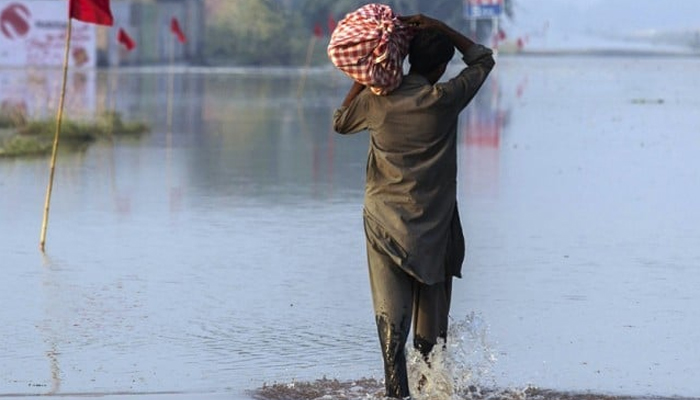Experts call for effective management against flash floods
Dr Suleri said that population explosion, deforestation, and urbanisation are the major causes of fading away of water management systems and infrastructure
Islamabad: Dr Abid Qaiyum Suleri, the Executive Director of Sustainable Development Policy Institute (SDPI) has said that the blockade of waterways due to illegal construction after flooding in hill torrent prone areas is inflicting heavy losses to infrastructure, livelihoods and human lives.
He was speaking at a one-day roundtable titled: "Climate Resilient Water Governance Approaches for Hill Torrent Management in Pakistan", organized by Sustainable Development Policy Institute (SDPI) on Tuesday in collaboration with Pakistan Rural Support Programmes Network (RSPN), and DAI.
The roundtable aims to stir result-oriented dialogue among the public, private sector, and civil society stakeholders to mull over hill torrents' floodwater governance issue. The roundtable incorporated community perspectives from representatives, who joined from hill torrent affected areas from D.I. Khan, Rajanpur, Swat apart from Sindh and Balochistan.
Dr Suleri said that population explosion, deforestation, and urbanisation are the major causes of fading away of water management systems and infrastructure. He added that the temperature systems of La Nina and El Nino effects and weather change had already increased precipitation to an erratic level.
“SDPI’s climate change and water management teams are closely working on these areas, and it's impacts that were above normal on girls, women, children and others,” he said. Mr Ahmed Kamal, the Chairman of Federal Flood Commission (FFC), said Pakistan has been facing the worst flooding due to reverse monsoon activity as monsoon used to start from Tarbella, but in 2022 the low pressure was built up in Sindh province that caused abnormal rains in Sindh and Balochistan.
The sporadic flooding in September 2022 in Swat and Kabul river also caused flooding in the areas, he said, adding that in Koh-e-Suleiman Range, Rajanpur and Dera Ghazi Khan areas hosted 11 hill torrents that caused havoc. He noted that the total water storage capacity of the country was 3.43 million acres feet that comprised three dams, i.e. Tarbela, Chashma, and Mangla. He underlined that the country's priority was low towards mitigating natural disasters that needs to be addressed. In 2022, he said monsoon season not only prompted the public sector but also the civil society, community and private sector at large to better manage the hill torrents water.
"More than 6,000 bridges have been established in the hill torrents' prone areas. However, it was ill planned, and poorly implemented as the water flow overtopped the capacity of built structures," he said and stressed the need to establish public, private sector and community nexus in this regard.
Darren Saywell, Senior Lead Specialist, Water Security, Sanitation and Hygiene (WSSH) at DAI Global, said the context of the discussion is important as it is based on the improvement in water management, climate resilience, and Green Pakistan movement that is crucial for the country's climate resilience.
-
 Leonardo DiCaprio's Co-star Reflects On His Viral Moment At Golden Globes
Leonardo DiCaprio's Co-star Reflects On His Viral Moment At Golden Globes -
 SpaceX Pivots From Mars Plans To Prioritize 2027 Moon Landing
SpaceX Pivots From Mars Plans To Prioritize 2027 Moon Landing -
 J. Cole Brings Back Old-school CD Sales For 'The Fall-Off' Release
J. Cole Brings Back Old-school CD Sales For 'The Fall-Off' Release -
 King Charles Still Cares About Meghan Markle
King Charles Still Cares About Meghan Markle -
 GTA 6 Built By Hand, Street By Street, Rockstar Confirms Ahead Of Launch
GTA 6 Built By Hand, Street By Street, Rockstar Confirms Ahead Of Launch -
 Funeral Home Owner Sentenced To 40 Years For Selling Corpses, Faking Ashes
Funeral Home Owner Sentenced To 40 Years For Selling Corpses, Faking Ashes -
 Why Is Thor Portrayed Differently In Marvel Movies?
Why Is Thor Portrayed Differently In Marvel Movies? -
 Dutch Seismologist Hints At 'surprise’ Quake In Coming Days
Dutch Seismologist Hints At 'surprise’ Quake In Coming Days -
 Australia’s Liberal-National Coalition Reunites After Brief Split Over Hate Laws
Australia’s Liberal-National Coalition Reunites After Brief Split Over Hate Laws -
 DC Director Gives Hopeful Message As Questions Raised Over 'Blue Beetle's Future
DC Director Gives Hopeful Message As Questions Raised Over 'Blue Beetle's Future -
 King Charles New Plans For Andrew In Norfolk Exposed
King Charles New Plans For Andrew In Norfolk Exposed -
 What You Need To Know About Ischemic Stroke
What You Need To Know About Ischemic Stroke -
 Shocking Reason Behind Type 2 Diabetes Revealed By Scientists
Shocking Reason Behind Type 2 Diabetes Revealed By Scientists -
 SpaceX Cleared For NASA Crew-12 Launch After Falcon 9 Review
SpaceX Cleared For NASA Crew-12 Launch After Falcon 9 Review -
 Meghan Markle Gives Old Hollywood Vibes In New Photos At Glitzy Event
Meghan Markle Gives Old Hollywood Vibes In New Photos At Glitzy Event -
 Simple 'finger Test' Unveils Lung Cancer Diagnosis
Simple 'finger Test' Unveils Lung Cancer Diagnosis




